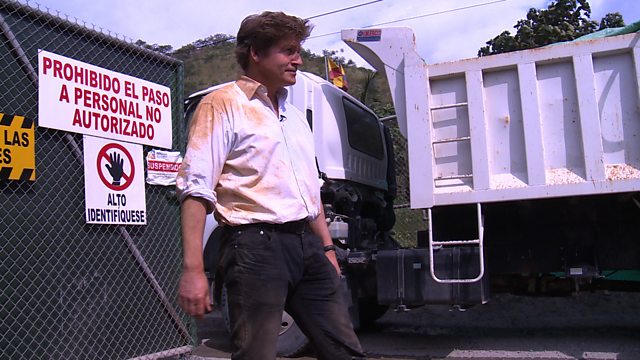
Ecuador
For One Square Mile, Leo Johnson travels to the historic town of Zaruma in southwestern Ecuador to tell the story of gold mining in the country.
For One Square Mile, Leo Johnson travels to the historic town of Zaruma in southwestern Ecuador to tell the story of gold mining in the country.
Gold has shaped Ecuador's past. It was the reason for both the Inca and the Spanish conquests. And it remains vital to the economy of modern Ecuador. President Correa has stated that Ecuador should no longer be "a beggar sitting atop a sack of gold" � and he has taken steps to exploit his country's gold wealth in the quickest way possible, by inviting foreign companies into the country to mine it. The move has outraged environmentalists and native populations, since the richest deposits are located beneath Ecuador's peerless rainforests.
In Zaruma we can tell the story of old gold, gold that has been exploited for over 500 years, since before the Spaniards arrived. Its mines were used by the Inca to try to get enough gold to pay for Atahualpa's ransom in the hands of Pizarro. They then witnessed the death of thousands of local Indians as the Spanish Colony demanded tribute. The town itself was founded by Spanish explorers in 1549 � a staging post in their search for El Dorado, the mythical 'city of gold'. But Zaruma itself was not far shy of that description: historians have estimated that over 2,700 tonnes of Zaruman gold were mined and shipped to Spain during the colonial period. After Ecuador's independence the mines were taken over by a British company and then by a US multinational.
Today, some 10,000 people in and around Zaruma still live off 'artisanal' mining, eking out the remnants of what was once Ecuador's richest gold deposit. The mining is small-scale but the problems it brings are large: unsafe conditions, child labour, environmental contamination, and mercury poisoning (mercury is used in the refining process). However, the town has made a huge effort to shed its reputation as a mining town and has become a thriving tourist destination. There is a mining museum, and the town's beautiful colonial-era architecture has helped them in their campaign to turn it into a World Heritage Site. Other economic alternatives have emerged, such as gourmet coffee � the forests around Zaruma are noted for the quality of their 'shade grown' beans.
There are indeed many stories to tell in our square mile � stories of exploitation and former glory. And underneath the veneer of a town sprucing up for the tourist trade there is the ongoing reality of mining carried out in appalling conditions. Recently there have been attempts to revive industrialized mining nearby and a Canadian company is moving in, encouraged by President Correa's pro-foreign investment policies, perhaps marking another cycle in the boom and bust history of a town both blessed and cursed by gold.
A community lucky to have a goldmine at its centre, but finding it tricky to deal with all the outside interest in their precious metal.
Last on
Broadcasts
- Sat 1 Jun 2013 01:30GMT����ý News except UK
- Sat 1 Jun 2013 08:30GMT����ý News except UK
- Sun 2 Jun 2013 14:30GMT����ý News except UK
- Sun 2 Jun 2013 20:30GMT����ý News except UK
Ecuador Direct
South American country finding its feet
